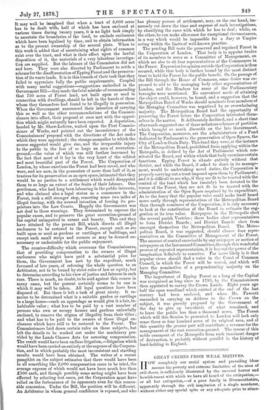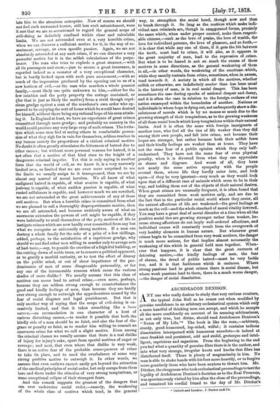GREAT CRIMES FROM WEAK MOTIVES.
HOW completely our social system and prevailing ideas assume the poverty and extreme limitation of the aims of evil-deers, is sufficiently illustrated by the unusual horror and bewilderment with which we have all heard of the extirpation,— or all but extirpation,—of a poor family in Monmouthshire, apparently through the evil inspiration of a single murderer, without either any special spite or any adequate prize to stimu-
late him to the atrocious enterprise. Now of course we ahoold not,feel such unwonted horror, still less such arstordshment, were it not that we are so accustomed to regard the general scope of evil-doing as definitely cetffined within clear and calculable limits. We are not astounded eyen at a very horrible crime, when we can discover a sufficient motive for it, in the way of re- sentment, revenge, or even specific passion. Again, we are not absolutely astounded at any such crime, if we can discover a very powerful motive for it in the selfish calculations of the perpe- trator. The man who tries to explode a great steamer,—with all its passengers and crew,—just to secure a great insurance, is regarded indeed as a monster of a very exceptional character, but is hardly looked upon with such pure amazement,—with so much of the impression produced by the opening out to us of a new horizon of evil,—as the man who murders a whole peasant family,—most likely one quite unknown to him,—either for the few eatables and the petty property the cottage contained, or (for that is just as likely the motive) from a vivid though capri- cious grudge against a man of the murderer's own order who ap- peared to be enjoying the sort of home which he would have desired for himeelf, without there being any rational hope of his soon attain- ingit. In England at least, we have no experience of great crimes committed through mere grudge ; and probably no country in the
world. could produce any very large crop of such crimes. The irrita- tion which some men fed at seeing others in comfortable posses-
sion of what they sigh for in vain for themselves, seldom reaches in any human society the proportions of a violent criminal motive. Noflpubt it often greatly stimulates the bitterness of hatred due to other causes ; but without more personal reasons for hatred, it is not often that a motive of that kind rises to the height of a dangerous criminal impulse. Yet this is only saying in another fopn that the world of evil, as we know it, is a very narrowly limited area, so limited that we are even more surprised to see the lin;dts we usually assign to it transgressed, than we are by almost any marvel of moral heroism. We all know of what llOalignant hatred is capable, of what avarice is capable, of what jealousy is capable, of what sudden passion is capable, of what rooted selfishness is capable, and however much we are revolted, we are not astounded at the great achievements of any of these evil motives. But when a horrible crime is committed from what we are pleased to call a thoroughly disproportionate motive, then we are all astounded, and become suddenly aware of what an enormous extension the powers of evil might be capable, if they were habitually to avail themselves of the petty motives of life to instigate crimes which are now hardly ever committed from any but what we recognise as universally strong motives. If a man can destroy a whole family for the sake of a prize of a few shillings, added, perhaps, to the satisfaction of a capricious grudge, why rffieuld we not find other men willing to murder only to avenge acts of lnd-taste,—say, to punish the erection of a frightful building, or the cutting-down of noble trees, or to remove a political opponent, or to gratify a morbid curiosity, or to test the effect of dismay en the public mind, or out of sheer impatience of the pre- dominance of men of some disagreeable personality, or for any one of the innumerable reasons which cause the various shades of mere dislike ? We usually assume that this class of metives can never lead to actual crime,—even more, perhaps, because they are seldom strong enough to counterbalance the good and kindly feelings of men, than because they are hardly ever strong enough to outweigh the apprehensions caused by the fear of social disgrace and legal punishment. But that is only another way of saying that the scope of evil-doing is ex- Naively limited, and that it takes something like a /u,s-us nadurw,—an accumulation in one character of a host of various disturbing causes,—to render it possible that both the kindly side of a man should be so faint, and also the fear of dis- grace or penalty so faint, as to render him willing to commit an enormous crime for what we call a alight motive. Even among the criminal classes we usually assume that there is a real dislike of injury for injury's sake, apart from special motives of anger or revenge ; and next, that even where that dislike is very weak, there is an active fear of the probable consequences of crime to take its place, and to need the overbalance of some very strong positive motive to outweigh it. In other words, we assume that even outlaws cannot easily get beyond the attraction of the cardinal principles of social order, but only escape from them here and there under the stimulus of very strong temptations, or some exceptional eclipse of their strongest fears. And this remark suggests the greatest of the dangers that can ever undermine social order,—namely, the weakening of the whole class of motives which tend, in the general I way' strengthen the social hond, ,though now and l.111/11
to break throngh it. So long as the: metivekwhich wake men criminal are, ,thopgli in, exaggerated forms, pregieely
the same which, when under proper control, melte thent,respect- able citizens,,-such as the bye of praise, the bye ef wealth, the love for individual persons, the bye of pleasure, and so forth, it is clear that while any one of them,- if it,geta the,bit,between the teeth, must lead to crime, it will also, as it, appears in the great majority of men, lead to the repression of „crime. But what is to be feared is . not so ranch the excess of these motives in some directions, as the general weakening of them
in other words, the weakening of the gmetioos,,whicht while they usually restrain from crime, eometimes,w,henin exoess, tend towards it. A society in which all the motiyes,.whether selfish or otherwise, are indefinitely, weaker than has been usual in the history of man, is in 'real social danger. This has been sometimes the case during epochs of national despair and decay, and it is often the case in relation. to the foreign outlaws of one nation encamped within the boundaries of another. Nations or individuals in whom hope is dying out,, not unfrequently show a dis- soluteness of morals whieh is by no means so much due to the growing strength of their temptations, as to the growing weakness of all these social bonds which keep temptations withiwtheir natural limits. And it is often the same with foreign immigrants of another race, who feel all the ties of life weaker than they did among their own people, and fall into crime, not becanse, their hopes are stronger, but rather because both their selfish fears and their kindly feelings are weaker than at home. They .have not the same fear of a public opinion which they only half- understand. They have not the same fear of even physic* penalty, when, it is divorced from what they can appredate as shame and disgrace. And worst of all, they have not nearly the same active sympathy with the people around them, whose life they hardly enter into, and , look upon—if they be very ignorant—very much as they would look upon that of a different race of animals which seem to be in their way, and holding them out of the objects et their natural deaiTep. When great crimes are unusually frequent, it is often found that they are committed from weak motives only, and are due to the fact that in the particular social, ..world where they,o0eur, the natural affections of ,life are wetikened,-the good feelings aa much as the evil—.and the whole standard of moral vitality lowered. You may have a great deal of .moral disorder at a time when all the positive social ties are growing stronger rather than weaker, be- cause strong affections do. not imply well-ordered affectipp,,an4 individual excess will constantly resplt from the overgrowth of very healthy elements in human nature. 13at whenever great crimes begin to be committed from very weak motives, the danger is much more salons, for that implies .ahnost necessarily, the weakening of ties which in general hold men together. When- ever that happens, it is clear that the great currents of deterring motive,—the kindly feelings of men, the fear of shame, the dread of public hatred—must be very feeble too, and it is that feebleness which is ominous. Where strong passions lead to great crimes there is social disease, but where-weak passions lead to them, there is a.much worse danger, —the danger of social dissolution.



































 Previous page
Previous page